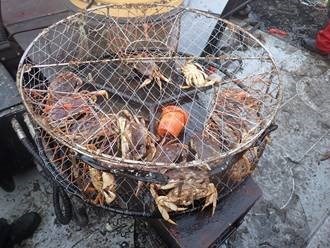A man netted for the second time fishing illegally for crab in the waters off North Vancouver has been handed a six-month jail sentence and a lifetime fishing ban for his repeated and flagrant flouting of fisheries laws.
Scott Stanley Matthew Steer of Gabriola Island was handed the jail term in B.C. Supreme Court Friday by Justice Peter Edelmann following a conviction in May 2021 on five fisheries offences.
“Mr. Steer led fisheries officers on a high-speed chase through a busy commercial port in the middle of the night with no navigational lights, engaged in various evasive manoeuvres, including hairpin turns and near collisions,” said Edelmann.
“The cost of the commercial crab fishing is lucrative for people who pay the cost of licensing and regulatory compliance. It is even more lucrative for poachers,” he adding, saying Steer was motivated purely by financial gain.
The case dates back to March 1, 2020, when just before midnight SeaBus operators reported a small vessel in Vancouver Harbour without its lights on. Fisheries officers were dispatched to the scene where they testified seeing the vessel listing to the side in a manner consistent with hauling crab traps up from the sea floor, according to Edelmann’s written decision in the case. Fisheries officers described how after they approached, the vessel suddenly straightened, left suddenly, and started driving erratically at a high rate of speed.
The chase ended at Lonsdale Quay, where fisheries officers jumped aboard the vessel, according to the judge’s description of events.
As fisheries officers approached, Steer tossed his cellphone into the ocean, in an attempt to get rid of evidence, said Crown prosecutor Adrienne Switzer. Divers later retrieved it.
Onboard the vessel, fisheries officers discovered four commercial crab traps, along with holding pens containing about 250 crab.
Fisheries officers testified there were no floats on the vessel, as required on commercial crabbing traps. Instead, they located a grappling hook and chain, which officers indicated are often used to retrieve illegal traps from the sea floor, wrote the judge.
Steer’s home was later searched under warrant, where additional fishing gear, including live cages, ground lines and a grappling hook – used for retrieving unmarked fishing gear – was located, as well as ownership documents and an insurance application for a fishing vessel, said Switzer.
At the time of the incident, Steer was under long-standing court orders not to possess any fishing gear or be on any fishing vessels.
Edelmann noted Steer has a long history of convictions for flouting fisheries rules.
In 2017, Steer was convicted for “strikingly similar” conduct of crab fishing at night in Burrard Inlet in 2013, said the judge, and was sentenced to 80 days in jail and a 22-year fishing ban. Steer was also convicted in 2008 and 2013 of fisheries offences including fishing during a closed time and unlicensed sale of fish. He was also found guilty of breaching court orders not to be on commercial fishing vessels and being in possession of fishing gear, contrary to a court order.
Switzer had asked for a two-year jail sentence, arguing Steer was one of the worst fisheries offenders.
Steer’s defence lawyer Bobby Movassaghi had called for a conditional sentence of no more than 12 months, calling jail time disproportionately harsh.
Steer will serve the jail term minus 36 days he was credited for time already spent in custody, which equates to 144 more days in jail.
In addition to the jail term, Edelmann also ordered Steer to complete three years’ probation, including 12 months when he must obey a curfew and 75 hours of community work service.
In a separate lawsuit, the government’s director of civil forfeiture is going after a house on Gabriola Island owned by Steer’s mother-in-law, where Steer and his wife live, alleging the house is “an instrument of crime” as it was bought with money earned from illegal activity or as a way to “launder money gained from the unlawful activity,” according to court documents.

